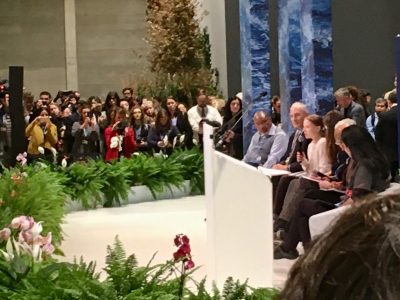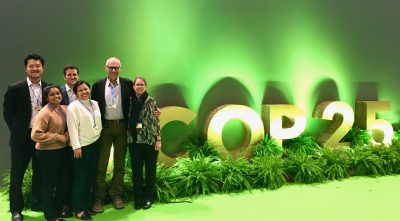Youth Energy at Madrid COP
Report from the UCLA Law delegation
Along with my UCLA Law colleagues Ted Parson, Alex Wang, and Siyi Shen, I’m in Madrid with three intrepid law students for the annual conference of the major international treaty addressing climate change, the UN Framework Convention on Climate Change. As these conferences go, this iteration was expected to be pretty sleepy. The conference remains in a post-Paris Agreement cleanup phase, focused on working out the important and highly technical rules necessary to bring that Agreement fully to life. Many of the so-called “Paris Rulebook” elements were resolved last year, in Poland; the ones that remain are, needless to say, the thorniest.
These include questions about how countries can cooperate to generate and trade emission reduction credits as a means of satisfying their own country obligations—so-called “Article 6” questions, named for the article of the Paris Agreement that calls for cooperative approaches to mitigation, including through the use of market mechanisms. As one example of an open Article 6 question, consider the case of a country (Country A) that reduces emissions through a domestic project funded by Country B. Under what circumstances may Country B purchase the right to use those emissions reductions in order to meet its obligations under the Paris Agreement? Should the answer depend on whether Country A’s own Paris Agreement obligations contain quantitative or only qualitative emission reduction goals? May Country A also use those same emissions reductions to meet other domestic or international obligations, or would that be “double counting”? How can double counting be avoided? At the moment, prospects for resolving these and other outstanding Art. 6 issues at this COP look murky at best. The subsidiary technical body considering these issues closed last night without having resolved Art. 6 questions, instead passing them along to the COP Presidency to see if political compromises can be reached at a higher-order level.
The COP process generally also continues to struggle in the absence of federal leadership by the US, the world’s largest historic emitter of GHGs. While the US remains a party to the UNFCCC and, for another 11 months or so, to the Paris Agreement, its State Dept. delegates are keeping their heads down. Former US Vice President Al Gore just spoke passionately to a packed room about the urgency of action, but his message feels a little like a missive from Administrations past and a vivid illustration of everything we’re missing from current US leadership. Hundreds of delegates from US states and cities with strong climate policies are here valiantly and steadfastly pushing the “We Are Still In” message, and their work is both essential and collectively hugely meaningful. Eventually, however, we’ll need federal reengagement if we want to use all available tools to create change.
All of which is to say it’s fairly bleak here—save for the vitality being injected into this process by youth voices. This year’s remarkable rise in global youth activism on climate change is on full display in Madrid, on the streets and in the conference halls. If I see a room with a line to get into it, more often than not the stage features people under the age of 20, with hundreds of the rest of us clamoring to hear their voices. The most packed rooms I’ve seen have featured Greta Thunberg, the Swedish teen Nobel Prize nominee, or other kids from countries around the world, including from both developed and developing countries. Their moral clarity contrasts starkly with the business-as-usual presentations and negotiations happening elsewhere. It’s a tone we are apparently thirsty to hear.
& speaking of nextgen voices, look later this week for a series of posts from my students on their experiences here!








Reader Comments